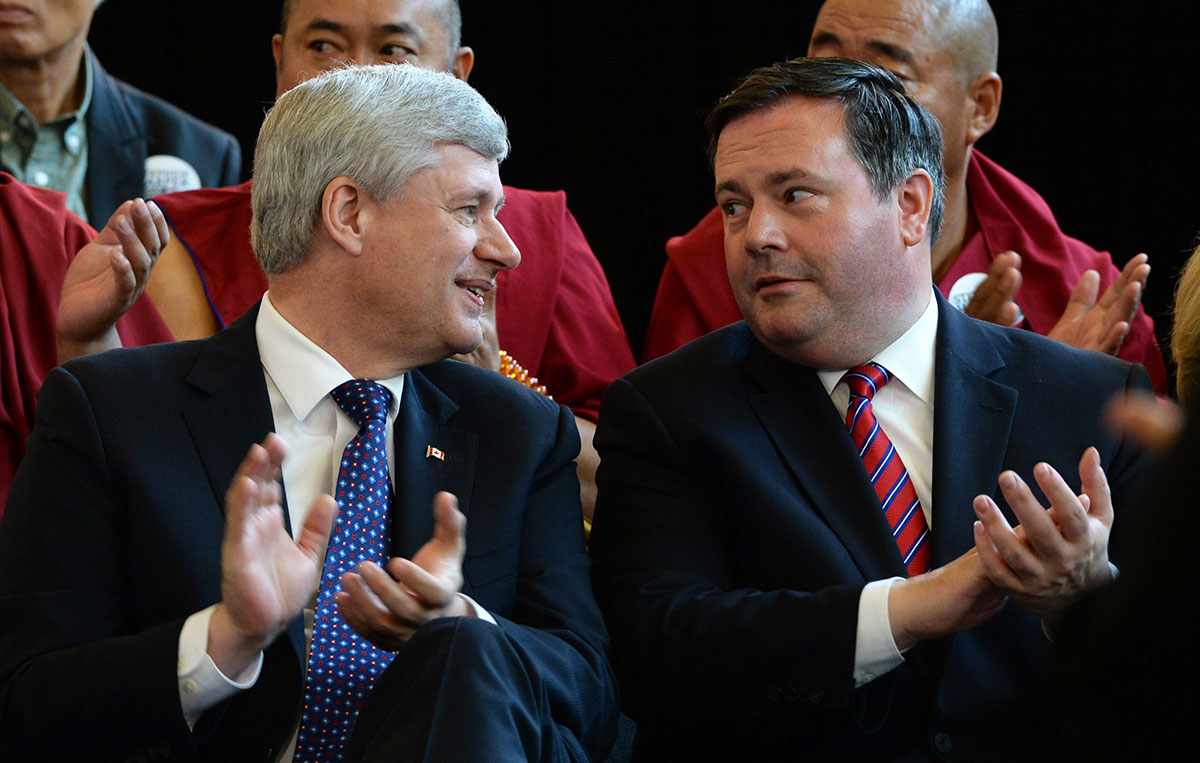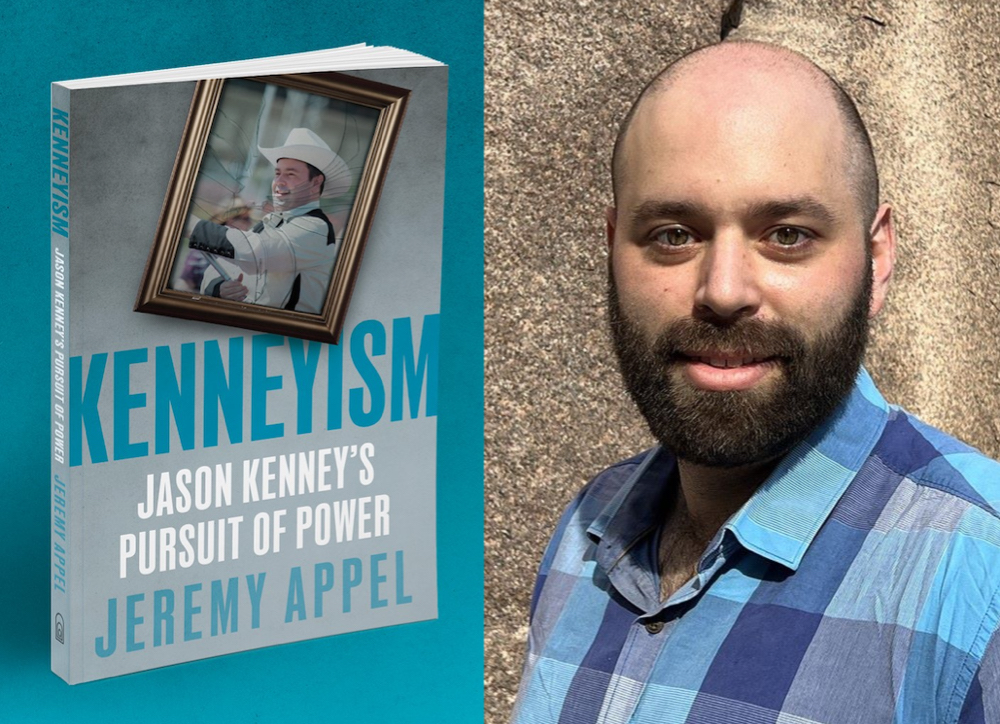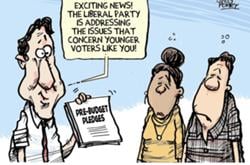- Kenneyism: Jason Kenney’s Pursuit of Power
- Dundurn Press (2024)
When Christina McCall and Stephen Clarkson wrote of former prime minister Pierre Trudeau, “He haunts us still,” the authors of Trudeau and Our Times recognized the lasting influence of the man who governed Canada for the better part of two decades. Indeed, it’s been nearly 25 years since the two wrote that line, and it’s still true today. But it isn’t just true of a larger-than-life figure such as the 15th prime minister.
Dig a little bit and you’ll find that the claim applies to several politicians, including some we might not think of often these days. Take, for instance, former, short-lived Alberta premier and federal cabinet minister Jason Kenney. After his dismal leadership review showing in the spring of 2022, Kenney resigned as premier and by the winter had left politics, largely to be forgotten and not particularly missed. And yet, Kenney haunts us still.
In the first major assessment of Kenney and his legacy, journalist Jeremy Appel’s Kenneyism: Jason Kenney’s Pursuit of Power charts in detail the rise, fall, effects and underlying philosophy of the enigmatic conservative’s political career. The effort is a success and the book ought to be on the shelf of any respectable political observer in this country.
Grounded in the concept of “Kenneyism” — originally formulated by researcher John Carlaw — Appel explains Kenney’s thinking as a mix of neo-liberal and neo-conservative ideological commitments stuffed into an authoritarian populist package. Through the concept, Appel reconciles seemingly contradictory political impulses, freedom and control, and tells a story worthy of the ancient Greeks, of hubris and irony, of rise and fall, of the costs of ambition and the punishments that often await the self-righteously self-assured.
Appel’s thesis is that Kenney is “an emblematic figure in right-wing politics who manipulated populist sentiment to implement policies that strengthened elite rule, exclusively benefiting those in positions of authority.” Backed by “theocratic inclinations” and committed to conservative institutions — the Catholic Church, the Crown — Kenney tried to balance a commitment to economic freedoms with a thick conception of how we ought to live together in a hierarchical social order buttressed by entrenched class power for economic elites.

For years, this approach worked for Kenney. As a cabinet minister in the Conservative government of Stephen Harper, particularly during his time as minister for citizenship, immigration and multiculturalism, Kenney was able to shape and reshape public policy to diminish or extend the presence of the state where it suited him, for instance in constructing a citizenship and immigration regime that prioritized economic outputs.
He was also able to help unite a fractured right in the late 1990s and early 2000s and, later, build a bridge between the Conservative party and new Canadians. These efforts helped Harper win a minority government in 2006 and, later, a majority in 2011, the party’s first since 1988.
Later, as premier of Alberta, Kenney would attempt a similar manoeuvre, uniting the right and taking on teachers, unions, health-care workers, environmentalists and the social welfare state itself in Alberta, only to be undone by the very populist, activist right-wing forces he had courted in his bid to build a right-wing coalition and dislodge the governing New Democratic Party.
To his credit, Appel understands Kenney as “a deep political thinker.” He gives the man his due as a shrewd and capable politician, if a deeply flawed leader, not a mere stuffed shirt parroting talking points or Coles Notes summaries of Milton Friedman or Ayn Rand. From his time as an anti-tax and social conservative activist crusader to his years as a federal and provincial politician, Kenney displays a consistency and coherence that eludes many of his contemporaries. Appel captures the man’s political philosophy and explains how Kenney, a true believer, put ideas — wretched as they were — into practice.
Kenneyism is at once a biography, an assessment of a political career and a history of the contemporary right in Canada. It’s both broad and thorough, covering Kenney’s thinking about and effect upon major public policy areas nationally and in Alberta, including citizenship, immigration, industry, energy, education, health care, COVID and more. Appel’s capacity to balance fact and analysis is a welcome departure from so many recent political biography offerings that are long on historical details and short on accounts of what those details add up to.

Readers sympathetic to Kenney may find the book casts the man unfairly, just as readers unsympathetic to Kenney are likely to find it right on the mark page after page. But Appel’s thesis is tight and cogent, backed by a close reading and presentation of the facts, and thus undeniably compelling for those willing to push themselves beyond the false “both sides” binary that screams for a “balance” that is impossible for any but the most anodyne writers.
Jason Kenney was a talented politician but a leader who wasn’t fit for prime time in the face of the pandemic. The arrival of COVID-19 shattered Kenney’s delicate balance in Alberta between more mainstream conservatives and far-right populists. Kenney ultimately proved too rigid, too indecisive and too willing to strike a Faustian bargain in the pursuit of power. As Appel puts it, he “played with fire and got burned.”
Obviously, Appel is no fan of Kenney. But he writes about the man as a human without giving in to the grand Canadian tradition of political biography as hagiography. Writing of Kenney’s downfall, he notes it was “an ignominious end for someone who played a crucial role in taking ideas once considered far to the right of the Canadian political consensus into the mainstream.” But he also assesses Kenney’s legacy, which is one of “narrowing the horizons of political possibility.” Appel argues that legacy is “pernicious.” Yes, indeed. Pernicious — in ways that haunt us still. ![]()

















Tyee Commenting Guidelines
Comments that violate guidelines risk being deleted, and violations may result in a temporary or permanent user ban. Maintain the spirit of good conversation to stay in the discussion and be patient with moderators. Comments are reviewed regularly but not in real time.
Do:
Do not: